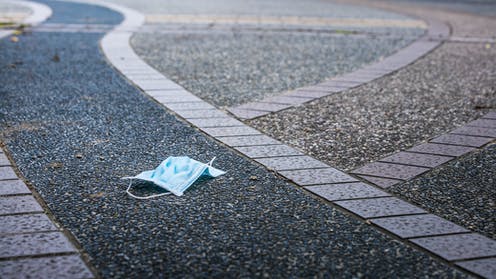PPE waste disposal a growing challenge
April 6, 2020 2020-12-01 1:30PPE waste disposal a growing challenge

PPE waste disposal a growing challenge
MANILA, Philippines — They end up on our sidewalks and in our waterways, those blue-and-white medical masks that used to be on someone’s face. They clog our rivers and drift out to sea where fish and other creatures could mistake them for food or they could dissolve into microplastics, harming corals and the marine ecosystem.
Suddenly, contracting the dreaded coronavirus from discarded masks isn’t the only concern of the public. Disposing the protective gear properly to minimize harm to the environment has become a headache.
This is part of a large and growing problem with personal protective equipment (PPE) during this pandemic, according to environment officials and activists in interviews this week. They believe that one way to reduce medical waste and still protect the people’s health is to adopt reusable PPE.
The Department of Environment and Natural Resources (DENR) reports that over 19,000 metric tons of infectious wastes, including PPE suspected of harboring pathogens, have been collected in just four months — from April to July — at the height of the lockdown.
But what is more challenging for the DENR are the infectious wastes coming from households: masks, food waste and other contaminated materials, which are hardly segregated and mixed with municipal waste, said Geri Geronimo Sañez, chief of the DENR’s hazardous waste management division.
The numbers are expected to rise with no immediate end in sight for the pandemic, prompting health and environmental groups to demand that the government lay out new waste disposal standards for the general public and promote reusable PPE whenever possible.
Now a household problem
Before the pandemic, it was mostly hospitals that dealt with infectious wastes, according to Paeng Lopez, a campaigner for Health Care Without Harm. But after the COVID-19 outbreak and with the universal and mandatory use of masks and face shields, that responsibility was added to the public.
Global scientific consensus says surgical masks are the most effective personal protection against droplets that carry the coronavirus. But these masks are made of nonwoven polypropyline fabric, a type of plastic that is not biodegradable. Most people are unaware that even masks have to be treated as infectious wastes in accordance with Republic Act No. 6969 and Republic Act No. 9003, both of which prescribe guidelines for hazardous waste management, Sañez said.
He strongly advised households to segregate and isolate the masks for at least three days—the period that a virus could survive outside a host — before disposing of them.
“In fact, I even suggest to others that they destroy it, cut it, because others may pick those up, wash it and reuse it,” Sañez said.
Poorly disposed masks will end up scattered on roads or in rivers, where the DENR has been scooping them up.
As with any waste, masks pose a threat to wildlife, said Marianne Ledesma, Greenpeace Philippines campaigner.
“Any plastic floating in bodies of water can be mistaken as food by marine creatures and they can be choking hazards. And when they break down into micro-plastics, reef corals start to absorb them as food and these corals can’t digest or release them back in the water,” she said.
Source -> This article was taken from Inquirer.net


